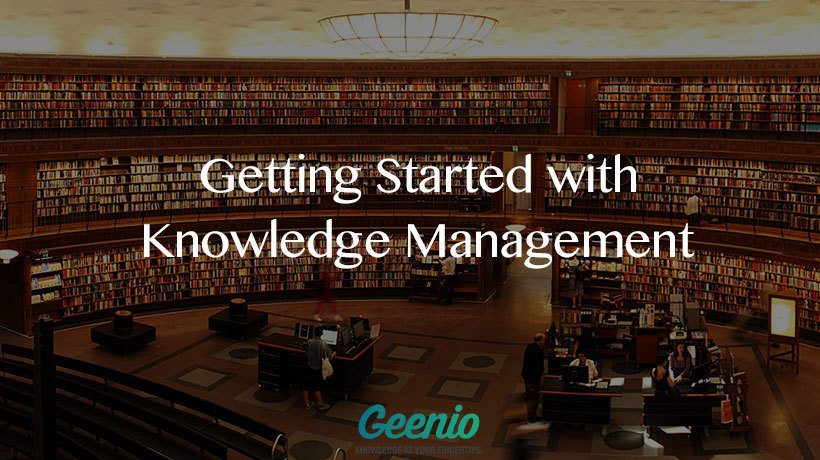How To Facilitate Personal Knowledge Management In eLearning
As the old saying goes: "Give a man a fish, and you feed him for a day. Teach a man how to fish, and you feed him for a lifetime". And that couldn't be truer for lifelong learning. As eLearning professionals, we have the rare opportunity to help our online learners live up to their true potential. One of the most effective ways to achieve this is through Personal Knowledge Management. Personal Knowledge Management is the process of collecting and organizing relevant knowledge. Here are 8 best practices to facilitate Personal Knowledge Management in your eLearning course design.
1. Conduct Pre-Assessments To Set The Benchmark
In order to give your online learners the tools they need, you have to know what they know. Pre-assessments allow you to create a benchmark, which they can use to track their progress. This also gives them the power to create a personalized plan to fill personal gaps and identify the ideal resources. Online assessments serve yet another purpose, as well, which is to motivate online learners along the way. Self-guided learning can be challenging for some, especially those who lack the focus and determination. However, being able to see how far they've come gives them the nudge they need.
2. Start With A Targeted Objective
Personal Knowledge Management isn't just learning as much as possible. It's about gathering relevant knowledge to overcome everyday challenges and broaden skill sets. As such, it must begin with a targeted objective. Encourage your online learners to set clear objectives before they start the research process. Ask them to break long-term into short-term objectives that are easy to monitor. This allows them to focus on one step at a time to maintain their motivation.
3. Create An Online Resource Repository
Develop a list of valuable resources your online learners can use to expand their knowledge base. For example, articles, video tutorials, and eLearning blogs that align with your learning goals. Alternatively, you can create a microlearning resource repository that features your own eLearning materials. For instance, bite-sized online simulations that explore work-related tasks or compliance-based serious games. The secret is to make eLearning convenient and easily accessible. Keep in mind that your online learners are looking for tools and information they need to solve a problem. An online resource repository gives them the opportunity to continually improve and expand their knowledge on their own time.
4. Promote Learning In Small Doses
Cognitive overload is a force to be reckoned with. Thanks to modern technology, we have a wealth of knowledge at our fingertips. This is a double-edged sword. Online learners can look up helpful tips and explore the subject matter 24/7. However, that also means there's a never-ending influx of stats, facts, and ideas. As such, online learners must know how to moderate their own consumption in order to prevent cognitive overload. Encourage them to learn in small doses and take frequent breaks. For example, suggest that they create a list of links they'll use for their research and concentrate on one sub-topic at a time.
5. Give Online Learners The Opportunity To Reflect And Refine Their Knowledge
Online learners must have the chance to reflect on the information, assimilate it, and then filter out the extraneous details. They don't necessarily need to know every discussion point in an article. As such, they can focus on what's important to them and commit that information to memory. For example, key stats that help them identify a pattern or tips to complete a work-related task more effectively. Encourage online learners to summarize the key takeaways after each eLearning activity and then reinforce the key takeaways with microlearning online resources.
6. Encourage Knowledge Sharing Among Peers
Every member of your audience has something unique to offer. Maybe they are proficient in a particular skill, or are well-versed on a specific topic. Whatever the case, peer-based knowledge is a valuable resource. Develop online group collaboration projects that allow online learners to work with their peers. Star an eLearning blog or online forum where they can share ideas and feedback. Encourage them to join your social media group and post online resources that others may find useful. Lastly, develop some group collaboration guidelines to prevent conflicts and keep the conversations on track.
7. Give Online Learners A List Of Must-Have Tools
There are a variety of virtual tools that can help your online learners manage their personal knowledge. For example, Project Management online tools that allow them to track eLearning assignments and compile a list of online resources. There are also MOOCs, social media groups, and video sharing sites where they can find valuable information. Provide them with a list of these essential online tools so that they can broaden and curate their own knowledge. Just make sure to update it on a regular basis and remove outdated links.
8. Develop Resource Criteria
As they say, "you can't believe everything you read on the internet". You should emphasize the importance of developing evaluation criteria. This helps your online learners identify relevant and reliable online resources so that they get accurate information. You might even consider a criteria checklist to help them find the right sources. In addition, start a database and invite your online learners to add their own suggestions. For instance, the online sources they've used in the past for specific subject matter.
Personal Knowledge Management allows your online learners to weed out irrelevant information and commit the key facts to memory. eLearning professionals can even use these Personal Knowledge Management tips when designing their own eLearning courses. You must be able to collect, verify, and organize information in order to optimize the eLearning experience.
One of the most effective ways to facilitate Personal Knowledge Management in eLearning is by integrating social learning into your eLearning course design. But how much do you really know about social learning? Read the article The Truth Behind 5 Social Learning Myths to discover the facts behind the most popular social learning myths.








